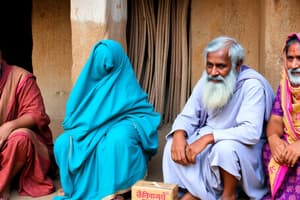Podcast
Questions and Answers
Who initially used the Marathi word 'Dalit' to refer to outcasts and untouchables?
Who initially used the Marathi word 'Dalit' to refer to outcasts and untouchables?
- The British Government
- Jyotirao Phule (correct)
- Mahatma Gandhi
- B.R. Ambedkar
In which year's census was the term 'Depressed Classes' used for the first time?
In which year's census was the term 'Depressed Classes' used for the first time?
- 1935
- 1955
- 1880
- 1921 (correct)
In which legislative act was the term 'Scheduled Castes' first mentioned?
In which legislative act was the term 'Scheduled Castes' first mentioned?
- The Government of India Act of 1935 (correct)
- The Untouchability (Offences) Act of 1955
- The Poona Pact
- The Government of India Act of 1919
Who coined the term 'Harijan,' meaning 'Children of God'?
Who coined the term 'Harijan,' meaning 'Children of God'?
According to the information, how were the 'depressed classes' defined in the 1931 census?
According to the information, how were the 'depressed classes' defined in the 1931 census?
What action did B.R. Ambedkar take to address the representation of Untouchables in the administration?
What action did B.R. Ambedkar take to address the representation of Untouchables in the administration?
In 1934, what percentage of vacancies in the government administration were reserved for Muslims and other minorities, including Untouchables?
In 1934, what percentage of vacancies in the government administration were reserved for Muslims and other minorities, including Untouchables?
What was Ambedkar's initial demand to improve the political representation for Dalits?
What was Ambedkar's initial demand to improve the political representation for Dalits?
What was the main outcome of the Poona Pact?
What was the main outcome of the Poona Pact?
According to the information provided, what does Article 17 of the Indian Constitution state regarding Untouchability?
According to the information provided, what does Article 17 of the Indian Constitution state regarding Untouchability?
How does the Indian Constitution ensure proportionality in reservations for Dalits and Adivasis?
How does the Indian Constitution ensure proportionality in reservations for Dalits and Adivasis?
What factor contributed to the increase in the number of Scheduled Castes?
What factor contributed to the increase in the number of Scheduled Castes?
What was Ambedkar's concern regarding the system of reserved seats?
What was Ambedkar's concern regarding the system of reserved seats?
Which act, intended to eliminate manual scavenging, has not been fully implemented in many places?
Which act, intended to eliminate manual scavenging, has not been fully implemented in many places?
What was the main provision of the Untouchability (Offences) Act passed in 1955?
What was the main provision of the Untouchability (Offences) Act passed in 1955?
What is the purpose of the Scheduled Caste and Scheduled Tribes (Prevention of Atrocities) Act of 1989?
What is the purpose of the Scheduled Caste and Scheduled Tribes (Prevention of Atrocities) Act of 1989?
According to the information why do atrocities against Dalits continue to occur?
According to the information why do atrocities against Dalits continue to occur?
What were the two primary strategies pursued by Ambedkar to advance the cause of Dalits?
What were the two primary strategies pursued by Ambedkar to advance the cause of Dalits?
What was the main limitation of the Independent Labour Party (ILP) formed by Ambedkar in 1936?
What was the main limitation of the Independent Labour Party (ILP) formed by Ambedkar in 1936?
Which party replaced the Independent Labour Party (ILP) and focused on promoting the cause of Dalits?
Which party replaced the Independent Labour Party (ILP) and focused on promoting the cause of Dalits?
What makes the Republican Party of India (RPI) distinct from the Scheduled Castes Federation (SCF) and the Independent Labour Party (ILP)?
What makes the Republican Party of India (RPI) distinct from the Scheduled Castes Federation (SCF) and the Independent Labour Party (ILP)?
What significant change in strategy occurred within the Republican Party of India (RPI) in the North in the 1960s?
What significant change in strategy occurred within the Republican Party of India (RPI) in the North in the 1960s?
Who was the founder of the Bahujan Samaj Party (BSP)?
Who was the founder of the Bahujan Samaj Party (BSP)?
What is the 'creamy layer' concept in the context of reservations?
What is the 'creamy layer' concept in the context of reservations?
What is a suggested solution to the challenge of the 'creamy layer' benefiting most from reservations?
What is a suggested solution to the challenge of the 'creamy layer' benefiting most from reservations?
Flashcards
Dalit
Dalit
In late 1880s, Jyotirao Phule used this Marathi word to refer to outcasts and untouchables.
Depressed Classes
Depressed Classes
A term used in the census of 1921 to categorize marginalized communities.
Scheduled Castes
Scheduled Castes
Term first mentioned in Government of India Act of 1935.
Harijan
Harijan
Signup and view all the flashcards
Untouchables
Untouchables
Signup and view all the flashcards
Depressed Classes (1931 Census Definition)
Depressed Classes (1931 Census Definition)
Signup and view all the flashcards
Scheduled Castes (renaming)
Scheduled Castes (renaming)
Signup and view all the flashcards
B.R. Ambedkar
B.R. Ambedkar
Signup and view all the flashcards
Separate Electorate
Separate Electorate
Signup and view all the flashcards
Poona Pact
Poona Pact
Signup and view all the flashcards
Article 17
Article 17
Signup and view all the flashcards
Proportionality
Proportionality
Signup and view all the flashcards
New religious groups
New religious groups
Signup and view all the flashcards
Dalit accountability
Dalit accountability
Signup and view all the flashcards
Employment of Manual Scavengers Act of 1993
Employment of Manual Scavengers Act of 1993
Signup and view all the flashcards
Untouchability (Offences) Act (1955)
Untouchability (Offences) Act (1955)
Signup and view all the flashcards
Scheduled Caste and Scheduled Tribes (Prevention of Atrocities Act) (1989)
Scheduled Caste and Scheduled Tribes (Prevention of Atrocities Act) (1989)
Signup and view all the flashcards
B.R. Ambedkar Experiments
B.R. Ambedkar Experiments
Signup and view all the flashcards
Republican Party of India
Republican Party of India
Signup and view all the flashcards
Dalits and Muslims
Dalits and Muslims
Signup and view all the flashcards
Kanshi Ram
Kanshi Ram
Signup and view all the flashcards
Creamy Layer
Creamy Layer
Signup and view all the flashcards
Study Notes
Changes in Terminology
- In the late 1880s, Jyotirao Phule used the Marathi word "Dalit" to refer to outcasts and untouchables who opposed Hindu society
- "Depressed Classes" was first used in the census of 1921
- "Scheduled Castes" was first mentioned in the Government of India Act of 1935
- Mahatma Gandhi coined the word "Harijan," which means "Children of God"
Colonial Period: Depressed Classes
- Before Independence, the British identified Untouchables as a social category
- In the 1931 census, depressed classes were defined by ritual impurity, lacking access to wells, schools, and temples
- The Depressed Classes were renamed Scheduled Castes in the Government of India Act of 1935
B.R. Ambedkar's Role
- Ambedkar pressured the British to establish quotas for the Untouchables in the administration
- In 1934, the government allocated 25% of administrative vacancies to Muslims and 8.3% to other minorities, including Untouchables, who constituted 12.5% of the population
Political Representation for Dalits: Separate Electorate vs Reserved Seats
- Ambedkar wanted to improve political representation for Dalits
- Ambedkar requested a separate electorate for Dalits
- Gandhi objected to a separate electorate, arguing it would divide Hindu society
- The Poona Pact was established as a compromise
- The Pact created a system of reserved seats, granting 148 seats to Untouchables in provincial assemblies
- The Pact eliminated the concept of separate electorates demanded by Ambedkar
The Constitution's Perspective
- Article 17 abolishes untouchability and prohibits its practice in any form
- Untouchability is not defined in the Constitution
Principle of Proportionality in the Indian Constitution
- Reservations for Dalits and Adivasis in education and assemblies must be proportional to their societal percentage
- The census informs the government about the number of each category to decide proportionality
- The number of Scheduled Castes has increased; however, the proportion of Dalits has remained consistent
Why Has the Number of Scheduled Castes Increased?
- New religious groups have become eligible with recognition of their low caste categories as Scheduled Castes
- Example: Sikh Dalits were admitted in 1956, and Buddhists were admitted in 1990
Two Political Systems
- One system involves first choosing 4 candidates from depressed classes by people from the depressed classes, followed by an election
- Another system involves reserving certain seats for depressed classes by the Delimitation Commission
The Different Political Systems
- Ambedkar wanted to keep the system that allowed local Dalits to select 4 candidates in any reserved constituency, who would then run in elections
- Congress leaders wanted to abolish the system
- Ambedkar felt that MPs or MLAs in reserved seats should require at least 35 percent of Dalit votes, in addition to the largest vote share to be elected
- Congress ignored this
- The system that emerged meant Dalit MPs and MLAs could be elected on a reserved seat without being specifically accountable to members of their own community
What Remains Unchanged
- Several laws have remained unimplemented
- The Employment of Manual Scavengers and Construction of Dry Latrines (Prohibition) Act of 1993 aimed to eliminate manual scavenging of human excreta, but is not implemented in many places
Positive Affirmation Actions
- The Untouchability (Offences) Act was passed in 1955, it reasserted that Untouchables could not be prevented from entering public places and should be respected
- The Scheduled Caste and Scheduled Tribes (Prevention of Atrocities Act) was passed in 1989, it introduced provisions to protect Dalits and Adivasis from physical and verbal abuse and violence
Atrocities Against the Dalits
- Despite the 1989 law, atrocities continued
- In 1968, 42 Dalit agricultural laborers were locked in a hut and burned alive by upper-caste local dominant castes in Kilvenmani, Tamil Nadu
- In September 2006, upper-caste people killed four members of a Dalit family in Khairlanji, Maharastra for resisting land expropriation
Why Do Atrocities Against Dalits Take Place?
- Police often decline to register Dalit complaints, and upper castes discourage witnesses from testifying
- Many Dalits remain poor and live in villages where the benefits of reservation in education are limited
B.R. Ambedkar's Experiments
- Ambedkar pursued two strategies: building a political party representing the working class or focusing on Dalits alone
- He established the Independent Labour Party (ILP) in 1936 to represent workers and peasants
- ILP did not succeed in attracting support beyond the Dalit community
Ambedkar and Republican Party of India
- ILP was replaced by the Scheduled Castes Federation (SCF) which promoted the cause of Dalits
- The approach also failed, leading to the Republican Party of India (RPI), which combined aspects of SCF and ILP
- It was open to other religious minorities, lower castes, and tribes
Republican Party of India
- The Republican Party of India gained importance in Northern India in the 1960s
- An alliance between Dalits and Muslims altered the logic of Ambedkar's project, from one of coalition of lower castes to religious minorities
The Rise of Bahujan Samaj Party
- Founder of BSP, Kanshi Ram was from a Chamar family in Punjab who had benefited from British policies
Challenges: The Creamy Layer
- Wealthier Dalits benefit most from quotas due to positive discrimination policies like reservation
- The Supreme Court has suggested excluding the creamy layer of Dalits from quotas
Studying That Suits You
Use AI to generate personalized quizzes and flashcards to suit your learning preferences.


